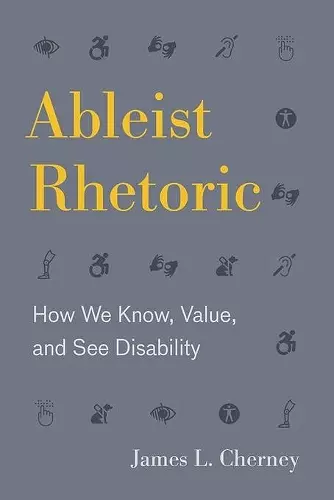Ableist Rhetoric
How We Know, Value, and See Disability
Format:Paperback
Publisher:Pennsylvania State University Press
Published:21st Dec '20
Should be back in stock very soon
This paperback is available in another edition too:
- Hardback£31.99(9780271084688)

Ableism, a form of discrimination that elevates “able” bodies over those perceived as less capable, remains one of the most widespread areas of systematic and explicit discrimination in Western culture. Yet in contrast to the substantial body of scholarly work on racism, sexism, classism, and heterosexism, ableism remains undertheorized and underexposed. In this book, James L. Cherney takes a rhetorical approach to the study of ableism to reveal how it has worked its way into our everyday understanding of disability.
Ableist Rhetoric argues that ableism is learned and transmitted through the ways we speak about those with disabilities. Through a series of textual case studies, Cherney identifies three rhetorical norms that help illustrate the widespread influence of ableist ideas in society. He explores the notion that “deviance is evil” by analyzing the possession narratives of Cotton Mather and the modern horror touchstone The Exorcist. He then considers whether “normal is natural” in Aristotle’s Generation of Animals and in the cultural debate over cochlear implants. Finally, he shows how the norm “body is able” operates in Alexander Graham Bell’s writings on eugenics and in the legal cases brought by disabled athletes Casey Martin and Oscar Pistorius. These three simple equivalencies play complex roles within the social institutions of religion, medicine, law, and sport. Cherney concludes by calling for a rhetorical model of disability, which, he argues, will provide a shift in orientation to challenge ableism’s epistemic, ideological, and visual components.
Accessible and compelling, this groundbreaking book will appeal to scholars of rhetoric and of disability studies as well as to disability rights advocates.
“Cherney shows how the powerful but mostly invisible rhetoric of ableism shapes beliefs about disability. Carefully argued case studies—from The Exorcist, to the cochlear implant debate, to the Casey Martin controversy—illustrate how ableism operates through the warrants of ‘deviance is evil,’ ‘normal is natural,’ ‘body is able’ and across epistemic, ideological, and visual dimensions. They form the heart of the book, making it accessible and engaging for use in an undergraduate rhetoric or disability studies course.”
—Cynthia Lewiecki-Wilson, coeditor of Embodied Rhetorics: Disability in Language and Culture
“As illustrated in this rich examination of ableism in Western society, ableism’s tendency to adapt to different time periods and zeitgeists while naturalizing itself through rhetorical repetition means that Cherney’s study heralds a new field of inquiry that takes ableism, geographical specificity, and rhetoric as its nexus.”
—Dominique Salas The Quarterly Journal of Speech
ISBN: 9780271084695
Dimensions: 229mm x 152mm x 14mm
Weight: 340g
200 pages